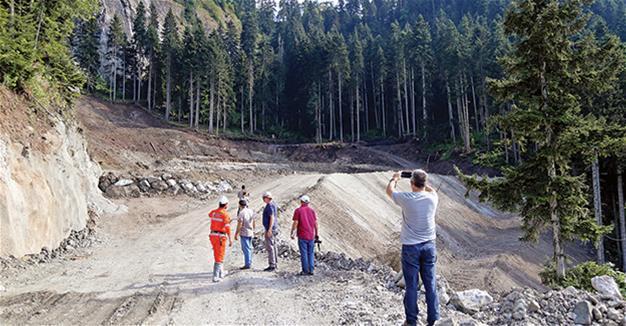Media committee reports mine construction damage in Black Sea’s Cerattepe
ARTVİN

A group of 30 media representatives visited the Cerattepe region of the Kafkasör highland in the Black Sea province of Artvin, examining and reporting the damage caused by a planned mine construction in the area, Doğan News Agency reported on Aug. 13.
The journalists went to the area upon the demand of the Green Artvin Association and the Istanbul Artvin Foundation, after Turkey’s Council of State approved a local court decision last month on the construction of a major copper mine in the area. Following an application by the Green Artvin Association to cancel the project, the top court ruled there was no need for its cancellation.
Istanbul Artvin Foundation head Mustafa Melek said they had invited the national media representatives to the Cerattepe region for the nation to see what was currently happening on the site. “There is frantic [mining] work. But, its negative effects have been apparent even at this stage of construction,” Melek said.
The Cerattepe hill is one of the country’s most idyllic areas of natural beauty and home to hundreds of species, with mining companies long having coveted the region as it is home to huge reserves of copper, silver, mercury, and gold.
Following Eti Bakır company’s (part of Cengiz Holding) relaunching its work in the area after the court ruling last month, a media committee went to see the site, with the authorities giving permission to see only a limited part of it.
The journalists observed that the water resources in the area, which provides Artvin’s drinking water, were polluted and the excavated soils from the mine tunnel were transferred by the wind to the forested lands, having a negative impact. The media representatives also photographed the trees cut down for building roads.
The journalists then met with Green Artvin Foundation’s head Nur Neşe Karahan, receiving information on the mine site construction. Karahan told the reporters that the Gavut stream in the Hatila Valley in the area was flowing “clear” prior to the construction, but following the mine’s construction, the water in the brook had been polluted. “We notified the situation to all of the authorized institutions and we received the answer that ‘There is no problem,’” Karahan said.
A 79-year-old local named Mevlüt Altuntaş living in the Taşlıca village in the province told reporters that the drinking water in the water-trench was now polluted, with the yield in his crops reducing.
The village’s cooperative president Hasan Yaşar touched upon the importance of beekeeping for the village in terms of income sources.
“We are producing honey in 2,200 beehives with the support of the Agriculture Ministry. We have the capacity to accomodate 25,000 bee colonies. But if there is mining here, beekeeping will be affected enormously,” said Yaşar.
 A group of 30 media representatives visited the Cerattepe region of the Kafkasör highland in the Black Sea province of Artvin, examining and reporting the damage caused by a planned mine construction in the area, Doğan News Agency reported on Aug. 13.
A group of 30 media representatives visited the Cerattepe region of the Kafkasör highland in the Black Sea province of Artvin, examining and reporting the damage caused by a planned mine construction in the area, Doğan News Agency reported on Aug. 13.